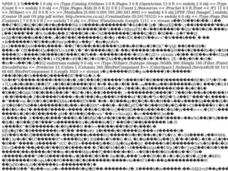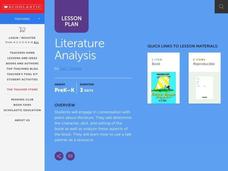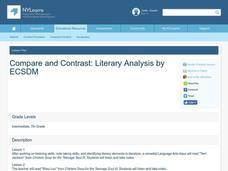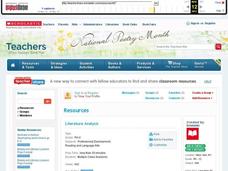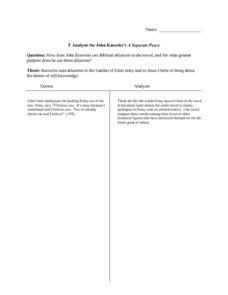Curated OER
Plot and Conflict in W.W. Jacob's "The Monkey's Paw"
Tenth graders analyze the use of literary elements in W.W. Jacob's "The Monkey's Paw." Literary analysis is accomplished by a review of the plot and order of events in the story. Learners work in pairs to match the events from the story...
Curated OER
Literary Analysis: Summary vs. Analysis
What is the difference between summary writing and literary analysis? A 16-slide presentation offers some basic requirements for both types of writing and helps readers identify each based on keywords used in both types of writing....
Curated OER
After Reading: "Plot the Plot" Activity in the Library Media Class
"Plot the plot" of "The Adventures of the Speckled Band" with your young readers. Take a few days to read Sir Arthur Conan Doyle's short story as a class or in pairs, having learners write down what they consider to be the most important...
Curated OER
Literary Analysis of The Minister's Black Veil
After reading The Minister's Black Veil, by Nathaniel Hawthorne as a homework assignment your class will complete a literary analysis. Learners will analyze important element of the story and take notes to help support their essays....
Curated OER
Writing a Literary Analysis
What makes writing literary? What comprises analysis? A 15-slide PowerPoint presentation, created by the Purdue University Writing Lab, tackles these questions. The explanations of what makes writing literary and what comprises analysis...
Curated OER
Elena by Diane Stanley
This story is bound to motivate your class. Learners read a story called Elena by Diane Stanley. The story is about a young woman who marries for love but is soon widowed during the Mexican Revolution. She takes her children to...
Curated OER
Literary Analysis - Young Goodman Brown
Why is literary analysis so important? Readers explore writing a literary analysis by reviewing literary elements such as character, metaphor, plot, setting, simile, personification, and style. They read "Young Goodman Brown" by...
Curated OER
Parts of the Plot: Constructing A Plot Diagram
After reading "The King of Mazy May" by Jack London, learners reinforce their literary analysis skills in this SMART board lesson. The provided SMART board file allows themto define elements of a short story, and then add it to the plot...
Curated OER
Literary Analysis of The Minister's Black Veil
Explore the short story "The Minister's Black Veil" by Nathaniel Hawthorne. First, read the short story and take notes on specific uses of the elements of writing such as characters, setting, plot, similes, personification, metaphors,...
Curated OER
Literature Analysis
Students examine the attributes of stories. In this literary elements lesson, students discuss the characters, plots, and settings of books they read in class.
Curated OER
Compare and Contrast: Literary Analysis
Seventh graders are able to use active listening skills, take notes and identify literary elements of a short story. They use/create graphic organizer, compare/contrast literary elements from various stories and compare and contrast traits.
Curated OER
Plot of a Short Story (SMART Board)
Help your pupils track the plot of a short story with this SMART Board activity. Using the short story "The Dinner Party" by Mona Gardner (though the lesson would work with any other short story), they define the exposition, rising...
Curated OER
Literature Analysis
Students explore the concept of literature analysis. In this literature analysis lesson, students discuss the story elements of a book. Students also discover how to pair share and use each other as a resource.
Curated OER
"User Friendly" Cause and Effect
Bring literature to life with your SMART board and this literary analysis lesson. While reading "User Friendly" by T. Ernesto Bethancourt (from the Holt Elements of Literature textbook by Kylene Beers), have your class discuss the theme...
National Endowment for the Humanities
Themes in Lord of the Flies
William Golding's Lord of the Flies is the anchor text for a lesson that teaches readers how to distinguish between a literary topic and a literary theme. Using the provided worksheets, groups first chart some themes and propose a...
National Endowment for the Humanities
Theme Analysis in A Christmas Carol
Why does Charles Dickens have Ebenezer go from scrooge to light-hearted and generous? From "Bah, humbug!" to "God Bless Us, Every One!" After rereading Dickens' preface to A Christmas Carol, learners analyze quotations from the tale that...
Novelinks
The View From Saturday: Concept/Vocabulary Analysis
Design your unit on The View From Saturday by E.L. Konigsburg with a concept and vocabulary analysis resource. It outlines the plot, literary elements, vocabulary issues, and any possible considerations for planning a differentiated...
Curated OER
Analyzing Literary Devices
Eighth graders identify figurative language and poetry in this literary analysis lesson. Using Through the Looking Glass by Lewis Carroll and a YouTube video for "The Walrus and the Carpenter," young readers complete a literary device...
Curated OER
The Metamorphosis: Concept/Vocabulary Analysis
Historically, Franz Kafka's The Metamorphosis has been difficult for many readers to grasp. From the difficult translation issues to the complex plot and themes, the novel's message and story can be lost when learners can't get their...
Curated OER
Introduction To Literary Analysis
Explore the fascinating ways in which authors use specific literary devices to create interesting and realistic texts. Using non-fiction articles with the subject of rogue waves, an excerpt from The Perfect Storm, by Sebastian Junger,...
Curated OER
Review of Literary Devices
Sixth graders review literary devices. They use both fiction and nonfiction texts to review metaphor, simile, alliteration, imagery, symbolism and personification. This lesson has a scripted guide for the teacher to follow.
Houghton Mifflin Harcourt
Core Analysis Frame: Fiction
Dig into any piece of fiction with a series of analysis questions. There are two levels of questions provided: basic and in-depth. The basic questions can be copied double-sided onto a single piece of paper, while the in-depth questions...
Curated OER
A Separate Peace - T Analysis
Reading A Separate Peace? Readers analyze important quotes that appear in John Knowle's classic novel using the provided graphic organizer. Learners record a passage and provide an accompanying analysis for each entry. Consider having...
Pittford Schools
Literary Devices, Techniques, and Elements
What's the difference between a speaker and an author? What's an example of anthropomorphism? Clarify the meanings of literary devices, elements, and techniques with a comprehensive glossary of terms.










